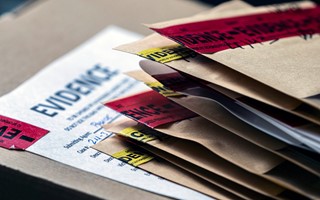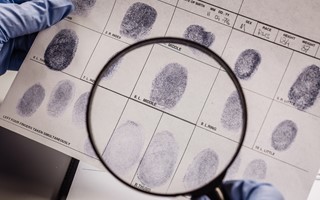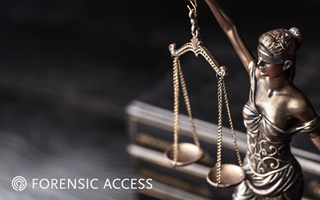News February 07, 2025
In the field of forensic science, drug analysis stands as a cornerstone in the pursuit of justice. From identifying substances to assessing drug yields and interpreting covert language, forensic drug experts provide critical insights that underpin many legal cases. This article draws from a recent Forensic Access webinar featuring Ryan Francis, Forensic Drug Consultant, who shared his expertise on the evolving role of forensic drug analysis in the UK’s legal system.
With extensive experience in forensic laboratories and organisations, Ryan has worked on thousands of cases requiring drug analysis and provided expert testimony in court. His work spans chemical and instrumental analysis, report evaluations, and the identification of emerging substances in the UK drug market. The insights shared during the webinar highlight the importance of accurate, unbiased forensic drug analysis in achieving fair and informed outcomes in legal proceedings.
The Role of Expert Witnesses in Drug Cases
Expert witnesses in forensic drug analysis hold a unique and impartial role within the criminal justice system. Their primary responsibility is to the court, regardless of who instructs them. An expert’s conclusions are guided solely by evidence, not by allegiance to the defence or prosecution. This impartiality ensures that justice is served fairly and transparently.
Experts also operate strictly within their field of expertise. Forensic Drug Consultants, for example, focus on identifying, quantifying, and interpreting substances in accordance with legal standards, this can also expand to conversations about drugs or valuations. They avoid speculation or commenting on areas outside their professional knowledge, ensuring their contributions remain robust and credible.
Core Areas of Forensic Drug Analysis
Forensic drug analysis encompasses a broad range of activities, each of which contributes to the accurate evaluation of evidence in drug-related cases.
Key areas include:
- Substance Identification: Identifying unknown substances is one of the most common tasks in forensic drug analysis. Substances may appear in various forms, such as powders, pills, or herbal material. While suspects might disclose the identity of these items, formal testing is essential for accurate reporting under the Misuse of Drugs Act 1971.
- Purity Determination: For substances such as heroin or cocaine, purity analysis determines the percentage of the active drug present in a seized sample. This is vital for assessing where the drug fits within the supply chain and for understanding connections between drug batches.
- Cannabis Yield Estimations: Unique to forensic drug analysis is the estimation of cannabis yields. This involves assessing how much saleable cannabis could be produced from a growing operation. Factors such as the number of plants, their condition, and the sophistication of the setup all influence yield calculations, which can significantly impact sentencing or asset recovery under the Proceeds of Crime Act.
- Drug Valuation: Valuations of seized drugs consider purity, market conditions, and packaging sizes. For example, during the COVID-19 lockdown, supply chain disruptions led to higher street prices for drugs. Understanding these variables ensures valuations presented to the court reflect real-world market dynamics.
- Interpretation of Covert Drug Language: Mobile phone messages often serve as evidence in drug cases, but the coded language used by dealers requires expert interpretation. Forensic Consultants decode terms and phrases to provide clarity in court, particularly in cases of conspiracy to supply.
- Emerging Substances and Legal Classification: As synthetic cannabinoids and psychoactive substances continue to evolve; experts play a crucial role in ensuring that new drugs are correctly identified and classified. This requires a deep understanding of both the Misuse of Drugs Act and the Psychoactive Substances Act.
Case Examples: The Value of Forensic Expertise
Anonymised case studies shared during the webinar highlighted how forensic drug analysis underpins fair legal outcomes by challenging assumptions and ensuring evidence is interpreted accurately.
Here are three notable examples:
- Cannabis Yield Reassessment: A police raid uncovered 25 mature cannabis plants and 52 cuttings. The initial assessment included all plants and cuttings, estimating the yield from 77 plants. However, the case was reassessed; factoring in the survival rates of cuttings and the capacity of the lighting system. This reassessment reduced the estimate to 65 plants, lowering the projected yield by nearly 1kg. The correction ensured accurate sentencing and asset valuation under the law.
- Drug Valuation Adjustment: In another case, cannabis valued at £2,500 was reassessed based on its packaging. The original valuation assumed the cannabis was divided into smaller deal-sized portions, but evidence showed it was seized as a single bulk package. The wholesale value was recalculated at £1,400, significantly reducing the financial implications for the defendant. This highlighted how improper assumptions in valuation can unfairly affect legal outcomes.
- Covert Drug Language Interpretation: A suspect charged with conspiracy to supply cannabis had over 10,000 pages of phone messages examined. After searching for terms like “kush” and “star dog,” only one message of interest was identified—a marketing message sent to the suspect rather than by them. This crucial finding contradicted the conspiracy charges, enabling the defence to challenge the prosecution’s case.
The Challenges of Emerging Substances
One of the most complex aspects of modern forensic drug analysis is addressing the emergence of new psychoactive substances, including synthetic cannabinoids. These substances often fall outside the definitions of the Misuse of Drugs Act due to their novel chemical structures. In a case, 2 out of 4 compounds in a seized synthetic cannabinoid sample were found not to meet the Act’s criteria but were covered under the Psychoactive Substances Act. Accurate classification was pivotal in ensuring appropriate legal proceedings.
Algorithms in Drug Supply Cases
Increasingly, algorithms are used in cases involving large-scale drug supply, such as “county lines” operations. These algorithms estimate the total quantity of drugs supplied based on phone data, such as calls and messages. However, limitations of these tools have been identified, including reliance on outdated consumption data and assumptions about exclusive purchasing from a single dealer. By scrutinising these algorithms, forensic experts provide courts with a balanced understanding of their reliability and limitations.
The Importance of Accurate Expert Assessments
The webinar underscored the critical role of Forensic Drug Consultants in reassessing evidence and ensuring accuracy in drug-related cases.
Key considerations for legal professionals include:
- Ensuring calculations, such as cannabis yields or drug supply estimates, account for all relevant factors.
- Reviewing valuation statements to confirm they reflect market realities and packaging evidence.
- Seeking expert interpretation of covert language and emerging substances to avoid misclassification or misrepresentation.
Conclusion: Supporting Justice with Forensic Expertise
Forensic drug analysis is a dynamic and challenging field, requiring precision, objectivity, and an in-depth understanding of both scientific techniques and legal frameworks. This expertise provides courts with the evidence-based insights needed to navigate the complexities of drug-related cases.
As drug markets evolve and legal classifications adapt, the role of Forensic Drug Consultants will only grow in importance. By applying specialised knowledge, the criminal justice system can ensure that investigations, prosecutions, and sentencing decisions are both fair and firmly grounded in evidence.
Contact Forensic Access
At Forensic Access, we are dedicated to delivering expert support in forensic drug cases. Whether you need assistance in reassessing evidence or have concerns about the accuracy of a case, our experienced team is ready to help.
Contact our Casework Management Team via email at science@forensic-access.co.uk or by phone on 01235 774870.


